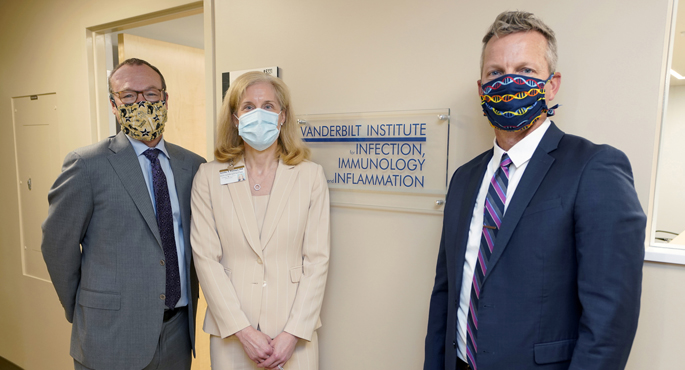
The Vanderbilt Institute for Infection, Immunology and Inflammation (VI4) recently moved into its new research and administrative home.
The state-of-the-art facilities in Medical Center North represent the first phase of research space for VI4, which was created in 2017 as a key initiative of the VUMC Strategic Directions. VI4 provides a trans-institutional framework for building and supporting the community of investigators at VUMC and Vanderbilt University who are involved in research related to immunology and infectious diseases.
“These fields are in the midst of a renaissance, with the recognition of emerging infectious diseases like COVID-19, the tremendous strides that have been made in cancer immunology, the realization that the microbiome is at the root of many aspects of human health and disease, and the rising threat of antimicrobial resistance,” said Eric Skaar, PhD, MPH, director of VI4 and Ernest W. Goodpasture Professor of Pathology, Microbiology and Immunology. “There are very few areas of science that are more exciting than microbiology and immunology right now, and there’s no better way to make sure Vanderbilt is at the leading edge of these research fields than to build this new interdisciplinary research space.”
Jennifer Pietenpol, PhD, Executive Vice President for Research at VUMC and director of Vanderbilt-Ingram Cancer Center, emphasized the value of initiatives like VI4 that bring researchers together across traditional departmental boundaries.
“VUMC’s continued strategy of investment in trans-departmental space leverages several of our distinctive capabilities — our collaborative culture and our continuum of basic and translational research. Close proximity of investigators with different expertise catalyzes new perspectives and research questions and promotes diversity and inclusion,” said Pietenpol, B.F. Byrd Jr. Professor of Oncology.
VI4 investigators are at the forefront of research related to SARS-CoV-2, the coronavirus that causes COVID-19. They are developing antiviral treatments and therapeutic monoclonal antibodies, and testing responses to potential vaccines.
“VI4, under Dr. Skaar’s leadership, pivoted quickly to address the current challenges of the coronavirus pandemic,” Pietenpol said. “VI4 investigators were integral to the rapid implementation of SARS-CoV-2 testing that occurred at Vanderbilt and enabled local and regional decision-making. Research discoveries being made by VI4 investigators are critical for the path forward in this pandemic.”
The new VI4 facilities house advanced imaging tools and standard resources for microbiology and immunology research as well as dedicated space for microbiome research, which requires anaerobic chambers for working with microbes that die if they are exposed to oxygen. The facilities also include a conference room, administrative offices and a break room.
In its three years as an institute, VI4 has participated in recruiting 12 faculty members, representing “tremendous growth” in this research area, Skaar said. VI4 directly supports research initiatives through pilot grant funding programs, contributes to shared research equipment and prioritizes the education and training of graduate and undergraduate students and postdoctoral fellows. The institute hosts a regular seminar series and annual symposium and promotes broad community awareness of microbiology and immunology research through its website and social media platforms and by hosting events such as MEGAMicrobe and The Scope.
VI4 currently includes 150 faculty members.












